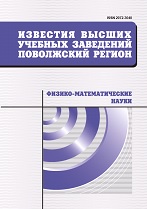|
This article is cited in 1 scientific paper (total in 1 paper)
Mathematics
Dynamics of one system of diffusionally coupled differential equations with auxiliary internal connection
L. I. Ivanovskiy
P. G. Demidov Yaroslavl State University, Yaroslavl
Abstract:
Background. The work is devoted to the dynamics of a system of differential equations with diffusion interaction and additional internal constraint with cubic nonlinearity. The relevance of studies of such a system is due to the fact that a slight change in the additional coupling coefficient allows one to obtain complex scenarios of the behavior of stable equilibrium states. For the system under consideration, critical dependences were found at which the zero equilibrium state loses its stability with the appearance of two spatially inhomogeneous states in one case and a cycle in the other. For the values of the parameters close to the critical ones, asymptotic formulas were obtained for the modes branching from the zero solution.
Materials and methods. For the problem in the complex, analytical and numerical solution methods were used. In the numerical study, special attention was paid to the values of the parameters at which the zero solution of the system of differential equations loses its stability.
Results. Critical dependences of the parameters at which bifurcations of the zero equilibrium state occur. At the values of the parameters close to critical, a normal form was constructed and on its basis the conditions for the appearance of inhomogeneous equilibrium states in one case and a cycle in the other were determined.
Conclusions. The results obtained can be used to solve problems of numerical modeling of some biophysical processes. It is also interesting to extend these results to other systems of differential equations with additional internal connection.
Keywords:
system of differential equations, cubic nonlinearity, zero equilibrium, loss of stability.
Citation:
L. I. Ivanovskiy, “Dynamics of one system of diffusionally coupled differential equations with auxiliary internal connection”, University proceedings. Volga region. Physical and mathematical sciences, 2020, no. 3, 15–30
Linking options:
https://www.mathnet.ru/eng/ivpnz68 https://www.mathnet.ru/eng/ivpnz/y2020/i3/p15
|

| Statistics & downloads: |
| Abstract page: | 39 | | Full-text PDF : | 19 | | References: | 10 |
|




 Contact us:
Contact us: Terms of Use
Terms of Use
 Registration to the website
Registration to the website Logotypes
Logotypes








 Citation in format
Citation in format 
